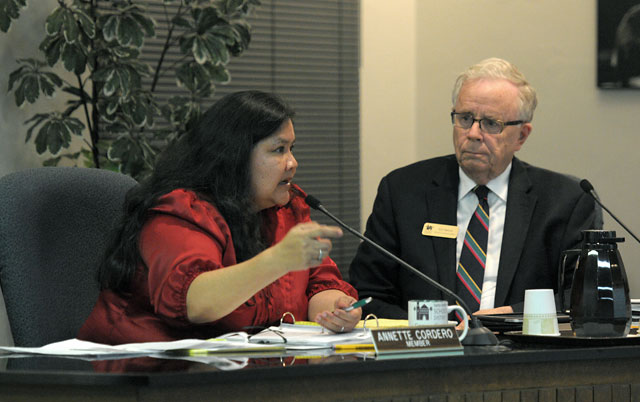School Board Lets the Dogs Out
Approves Drug-Sniffing Canines in Divided Vote

The Santa Barbara Unified School Board voted 3-2 to implement a contraband detection and deterrent program effective the start of next school year. In other words, drug-sniffing dogs will soon be making their way through the classrooms of the district’s secondary schools.
The two no votes, Annette Cordero and Monique Limón, expressed several concerns about the program, primarily that it would further the perception that certain students were being targeted.
In response to such worries, Boardmember Ed Heron said, “I have a hard time understanding this idea of targeting. We are targeting illegal drugs.” Kate Parker argued that dogs actually “take one more opportunity for bias out of the equation” because they have no idea whose backpacks they are searching, and moreover, the searches would be randomized.
Cordero replied that, although the dogs would detect drugs, “The dogs don’t hand out the punishment.” Limón made the point by saying, “I do not feel comfortable voting for a new tool given that the tool, policy, and practice are not aligned,” her point being that, even if the searches are completely fair and unbiased, they would take place within a system where the disciplinary outcomes for whites and Latinos are skewed.
In a special hearing on discipline last month, Superintendent David Cash revealed that, during the last three years, three Latino boys were suspended for every white male suspension, and that the ratio rose to six-to-one for females. To realign those numbers, Cash is advocating a restorative justice–based discipline policy that focuses less on punitive measures and more on forcing rule-offenders to remedy their actions. On Tuesday night, however, Cash said that it would take several years to fully implement a restorative justice policy.
Cash also said he spoke at length with administrators and the English Learner Advisory Committees at all of the district’s secondary schools, as well as with parent groups. “In almost every circumstance, parents were in favor of this happening at schools,” said Cash. When Cordero asked if he consulted with community groups like Esperanza and PUEBLO, he said no.
The only public commenter was Layne Wheeler, president of the Santa Barbara Teachers Association (SBTA). He did not endorse or denounce the use of drug-sniffing dogs, but he did raise several concerns: the disruption of class, the anxiety caused by false positives (on the belongings of students and teachers), whether the money spent on the program would be more effectively spent elsewhere, and how exactly the searches would be conducted.
Some of that nitty-gritty was discussed before a second vote to choose between two services, Interquest Detection Canines and Kontraband Interdiction and Detection Services (KIDS). The former would be slightly cheaper than the latter at $410 per full-day visit. Both suggest two visits per school site per month, and they can visit more than one school in a day. KIDS offers a richer insurance plan and the endorsement of Director of Student Services Marlin Sumpter, whose former employer in Modesto contracted with them.
The school board unanimously chose to request a contract with Interquest, however, because its dogs are trained to detect commonly abused prescription drugs, as well as narcotics, alcohol, and gunpowder.
While discussing the fiscal impacts of contracting out for a canine detection service, the board briefly considered limiting visits to once a month. Cordero questioned the effectiveness of such a policy because once that visit was over, kids would know they could bring drugs to school for the rest of the month. At that point, Cash interjected and said that most districts do not discuss such details publicly. “Based on that, I’d assume you recommend two visits per month,” Parker said to Cash facetiously. When he replied affirmatively, the boardroom, which at that point had filled with parents of children at Peabody elementary (whose charter is up for renewal), burst into laughter.



